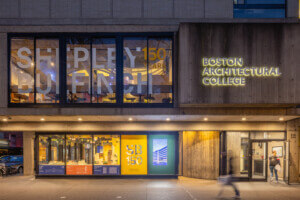With housing prices soaring and available stock dwindling in cities across the country, the micro-unit apartment trend has spread to Boston for the first time. National Development and New York-based Ollie have teamed up to bring a 14-story co-living micro-unit apartment building to Boston’s South End.
Ollie is no stranger to the micro-unit game, and its modular, nARCHITECTS-designed Carmel Place drew media attention after being built offsite and assembled in only a month. With units ranging from 260 to 360 square feet but market-rate prices, Ollie included concierge service and a suite of luxury amenities in an attempt to lure in tenants, a model it will attempt to replicate in Boston.
Planned for the Ink Block complex in the South End, the Elkus Manfredi Architects-designed, 245-unit building will follow the co-living model, offering fully furnished apartments, free housecleaning services, and communal events that are meant to make the transition to co-living as clean as possible. With many of the units under 400 square feet, Ollie is trying to win over young professionals who either won’t be home that often, or won’t mind the lack of space.
“You walk into this building and you feel like you’re in a millennial resort,” National Development managing partner Ted Tye told the Boston Globe. “It’s kind of like a grown-up college experience.”
Combining the micro-unit and co-living models seems like a natural progression, as developers can trade unit square footage for the added experience that tenants receive. While the still-unnamed development isn’t the first micro-unit building in Boston, it is one of the first to bank on the idea that residents would willingly pay more for added services.
The co-living model is catching on across the country, and Ollie has similar buildings in New York City and Pittsburgh, with others currently under construction in Jersey City and Los Angeles. WeWork’s WeLive buildings have also sprung up in New York and Washington, D.C., although their leases are typically short-term. The dorm-style communal living arrangement, complemented by access to WeWork office space in the same building, has been met with mixed reviews so far. Micro-unit arrangements have not arisen without their share of criticism, either. Still, Ollie feels that the demand for shared living spaces is particularly high in Boston.
The Ink Block co-living building will still need approval from the Boston Planning and Development Agency before it can proceed. More detailed plans will be coming in the next month, and construction should begin sometime in 2018.










